| Srl | Item |
| 1 |
ID:
158131
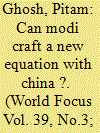

|
|
|
|
|
| Summary/Abstract |
India and China possess a robust dispute redressal mechanism erected over a period of time but Doklam was an altogether different challenge. The unprecedented clash involved Indian and Chinese troops facing off on the soil of a third country which may yet give rise to future complications. During the standoff, Chinese propaganda machinery issued repeated threats of breaching India’s boundary through Pakistan occupied Kashmir.
|
|
|
|
|
|
|
|
|
|
|
|
|
|
|
|
| 2 |
ID:
158116
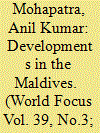

|
|
|
|
|
| Summary/Abstract |
One of the signs of the South Asian “Spring” of 2008 eroding into a “Winter” is the recent developments in the island nation of the Maldives. Nepal’s long struggle to draft an effective Constitution with a stable government since 2008, Pakistan’s democratic leadership continuing to speak the language of the military establishment on several acts of terror, the struggle of the Awami League-led Government to fight the challenges emanating from the alliance of the radical forces who have threatened even to boycott the 2018 polls in Bangladesh, and, the silence and dissent-free democracy in Bhutan etc. are the other signs.
|
|
|
|
|
|
|
|
|
|
|
|
|
|
|
|
| 3 |
ID:
158135


|
|
|
|
|
| Summary/Abstract |
The relationship between India and Afghanistan dates back thousands of years, having shared similar cultural ethos and a desire to maintain cordiality. Their harmonious engagement however came to a halt after the Taliban took over the Afghani administration. Post 2001 India has continuously engaged itself to play a more constructive role in bringing back Afghanistan on a more fruitful track of development.
|
|
|
|
|
|
|
|
|
|
|
|
|
|
|
|
| 4 |
ID:
158124
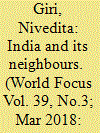

|
|
|
|
|
| Summary/Abstract |
India is the most generous and liberal nations in the world and cordial towards its neighbours. The statement can be validated from India’s foreign policy record since ancient times. There are ample research works which analyse that India has always religiously practiced peaceful coexistence with neighbours.
|
|
|
|
|
|
|
|
|
|
|
|
|
|
|
|
| 5 |
ID:
158127
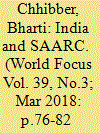

|
|
|
|
|
| Summary/Abstract |
Recent setback on the SAARC front notwithstanding it is high time that cooperation in South Asia should move from potential to performance. Even after three decades of existence SAARC members have failed to cooperate fully and take advantage of regional opportunities. Better infrastructure facilities like development of means of transportation will certainly help. South Asian countries should also abolish non-tariff barriers so that there is free flow of trade apart from cooperation in the area of customs procedures.
|
|
|
|
|
|
|
|
|
|
|
|
|
|
|
|
| 6 |
ID:
158118


|
|
|
|
|
| Summary/Abstract |
On January 4, 2018, President Donald Trump announced the suspension of all security-related assistance to Pakistan until Islamabad could prove its commitment to fighting terrorism and sever its ties with the Taliban.
|
|
|
|
|
|
|
|
|
|
|
|
|
|
|
|
| 7 |
ID:
158122
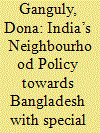

|
|
|
|
|
| Summary/Abstract |
The art of conducting the foreign affairs of a country lies in securing the national interest of the country or if put in simple words it is the method of investigating what is most advantageous to the country in the long run. However when the country has to formulate its policies towards its immediate neighbours, it is often seen that the concern for the border security is prioritized over all other considerations.
|
|
|
|
|
|
|
|
|
|
|
|
|
|
|
|
| 8 |
ID:
158120
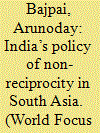

|
|
|
|
|
| Summary/Abstract |
The principle of Non-Reciprocity and greater focus on regional connectivity are the two important aspects of India’s contemporary South Asian Policy. Non-Reciprocity stands for a foreign policy posture in which a nation extends a helpful gesture to other nations without expectation of any reciprocal response from them. In South Asian context it means that India will do her best for the growth and prosperity of her neighbor without any reciprocal returns from them for the same.
|
|
|
|
|
|
|
|
|
|
|
|
|
|
|
|
| 9 |
ID:
158132


|
|
|
|
|
| Summary/Abstract |
India inviting BIMSTEC member states to the BRICS outreach meeting in 2016 and to the recent Republic-Day Parade has been realised by many as India’s new strategic move and ignoring of SAARC. PM, Modi invites BIMSTEC rather than SAARC member states has raised many questions among scholars. This has been seen by many as India’s new regional politics in its neighbourhood. His main objective is to keep Pakistan and its best friend China out of the South Asian regional groupings.
|
|
|
|
|
|
|
|
|
|
|
|
|
|
|
|
| 10 |
ID:
158133


|
|
|
|
|
| Summary/Abstract |
Probably Bhutan is only the immediate neighboring country with whom India has no any direct confrontation in all respect. Keeping in the mind of past track record that we have with Bhutan, its seems very unlikely to have to change its status quo. However foreign policy is all about serving its own national interest and one need to act in accordance changing internal and external international milieu. With time national interest is bound to get change.
|
|
|
|
|
|
|
|
|
|
|
|
|
|
|
|
| 11 |
ID:
158123


|
|
|
|
|
| Summary/Abstract |
In a modern contemporary phase, India’s relations with its north-eastern neighbouring country Myanmar has travelled a long journey from previous UPA (United Progressive Alliance) government’s ‘Look East Policy’ to present NDA (National Democratic Alliance) government’s ‘Act East’ foreign policy.
|
|
|
|
|
|
|
|
|
|
|
|
|
|
|
|
| 12 |
ID:
158125
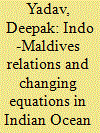

|
|
|
|
|
| Summary/Abstract |
India and Maldives share ethnic, linguistic, cultural, religious and commercial links steeped in antiquity and enjoy cordial and multi-dimensional relations. India was among the first to recognise Maldives after its independence in 1965 and to establish diplomatic relations with the country. India established its mission at Malé in 1972.
|
|
|
|
|
|
|
|
|
|
|
|
|
|
|
|
| 13 |
ID:
158117


|
|
|
|
|
| Summary/Abstract |
Among all world leaders at present it seems that that Donald Trump President United States and Xi Zinping President of China are the most talked about and could be proving to be the most powerful. Both US and China are economically strongest countries and that makes the leaders strong. Xi Zinping policies are long term and initially looks attractive and beneficiary for both the countries that is with whom it is negotiating, but later it is only China. President Donald Trump’s policies are only ‘for Americans’ based.
|
|
|
|
|
|
|
|
|
|
|
|
|
|
|
|
| 14 |
ID:
158128


|
|
|
|
|
| Summary/Abstract |
The Princely State of Jammu and Kashmir comprises the Kashmir valley, Jammu, Poonch, the remote dependencies of Gilgit, Baluchistan and the isolated province of Ladakh or “Little Tibut.”1 Their size and area almost matched the total area of England, Wales and Scotland.2At the time of partition, about 90% of the valley’s population was Muslims.
|
|
|
|
|
|
|
|
|
|
|
|
|
|
|
|
| 15 |
ID:
158129
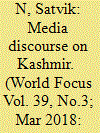

|
|
|
|
|
| Summary/Abstract |
News media known as the fourth estate of democracy has been considered as one of the important pillars of domestic policy making. It provides information and becomes the harbinger of public opinion that the policy makers cannot afford to ignore. The impact of media on foreign policy making is however a little more indirect as the policy making here can not be dependant only on pubic opinion.
|
|
|
|
|
|
|
|
|
|
|
|
|
|
|
|
| 16 |
ID:
158119


|
|
|
|
|
| Summary/Abstract |
It is not merely a balancing power, playing a second fiddle role. Now it has become power whose words are taken seriously. The definition of smart power according Joseph Nye is an ability to use the soft power along with the hard power. India has displayed this charisma against China. After Doklam India created a new group which can deter Chinese influence not merely in Pacific but in other parts of the world.
|
|
|
|
|
|
|
|
|
|
|
|
|
|
|
|
| 17 |
ID:
158134


|
|
|
|
|
| Summary/Abstract |
In a globalised world of today, every nation tries to promote their relations with other countries by opening up their economy at the global market. They form bilateral or multilateral groupings among themselves either at the regional level or global level. Thus, economy becomes one of the primary determining factors of a nation’s power in current trend.
|
|
|
|
|
|
|
|
|
|
|
|
|
|
|
|
| 18 |
ID:
158126
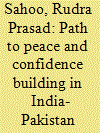

|
|
|
|
|
| Summary/Abstract |
A meaningful bilateral relation sustains in the strong support of trust and confidence. India-Pakistan the two major players in South Asia unfortunately has not cultivated this due to their long standing political and ideological difference since their birth as a nation-state in 1947.
|
|
|
|
|
|
|
|
|
|
|
|
|
|
|
|
| 19 |
ID:
158121


|
|
|
|
|
| Summary/Abstract |
The year 2017 has been historical for Nepal for the sole reason that it took a strong leap forward towards entrenching its hard-earned democracy. The said elections were held for all the three tiers of government i.e. federal, provincial and local. It was for the first time in the history of Nepal that all the elections were organised in the same calendar year after the promulgation of the new constitution of Nepal in September 2015.
|
|
|
|
|
|
|
|
|
|
|
|
|
|
|
|
| 20 |
ID:
158130


|
|
|
|
|
| Summary/Abstract |
The NDA government led by Prime Minister Narendra Modi completed more than three years in power. “It is famously said that foreign policies of any country do not change with the change in regime, there is a certain ‘shift’ in the foreign policy”. India’s foreign policy is in a transitional phase where new friends are being made. In the more than three years would be remembered for the frequent number of foreign visits undertaken by the Indian Prime Minister.
|
|
|
|
|
|
|
|
|
|
|
|
|
|
|
|